When I recently read Wendy Wasserstein’s The Sisters Rosensweig, which opened in 1992, I sensed it was written in response to the women’s movement at the time. Wasserstein’s 1988 The Heidi Chronicles, which I saw during its Broadway run, had done this more explicitly, but in its own way Sisters Rosensweig was also Wasserstein having a conversation with women who were being affected by, and spearheading, the women’s movement in various ways.
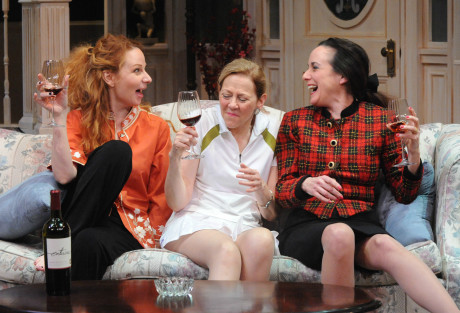
My suppositions were confirmed when I saw Theater J’s wonderful production (which my colleague Ravelle Brickman’s five-star review praised as comic and cathartic).
Wasserstein’s four male characters are fascinating, and I intend here absolutely no slight to the fine actors who play them: Josh Adams as Tom, the young radical; Edward Christian as Nick, the proper conservative; Michael Russotto as Mervyn, the romantic businessman; James Whalen as Geoffrey, the flamboyant theater director—each in turn commands our attention. But one cannot but notice that, structurally and intentionally, it is the four female characters who are the beating heart of the play. And by the last scenes, when all the men have made their final exits, the emotional impact of that fact hits home.
Intrigued, I invited the four women of The Sisters Rosensweig to join me in a conversation that would look at the play through their experience of it as actors and through the eyes of the characters they play: the eldest sister Sara, a high-powered international banker (Kimberly Schraf); middle sister Gorgeous, a voluable radio host (Susan Rome); youngest sister Pfeni, an intrepid travel writer (Susan Lynskey); and would-be rebel Tess, Sara’s college-age daughter (Caroline Wolfson).
All four graciously accepted my invitation and generously offered to sit down in between a matinee and an evening performance—their first two-show day of the run. I hoped it would be “funsy” (to borrow the word Gorgeous uses), and indeed it was. But it also yielded rich and resonant insights into the play then and now—not least because the sense of family that links their characters in the script was fully present among them in real life.
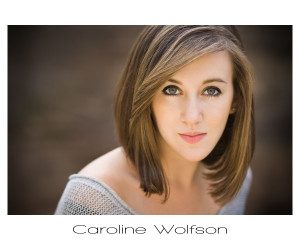
Caroline Wolfson (Tess): I was one year old when this show was written. Even though it was a different time, there’s universal ideas in the play that everyone goes through about seeking truth and seeking identity.
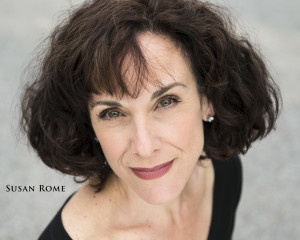
Susan Rome (Gorgeous): It occurred to me the other day that six of the eight characters are not living their truth. I think Mervyn lives his truth—after going to the mountain top and seeking it. Tom lives his truth in a very refreshing, uncomplicated way; he speaks in declarative sentences and he knows who he is. But for the rest of us, by the end of the play each of us is a little bit closer to living our truth. We connect. It’s an extension of our connection in the dressing room. It’s a very happy ladies dressing room.
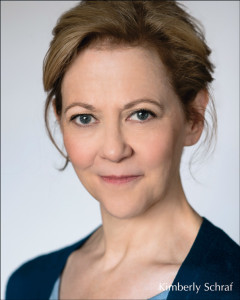
Kimberly Schraf (Sara): It really helps when you don’t have to fabricate too much out on stage. And you love the person you’re talking to, even if you’re excoriating them. It gives you trust. It gives you a foundation. And we’re very fortunate in that regard.
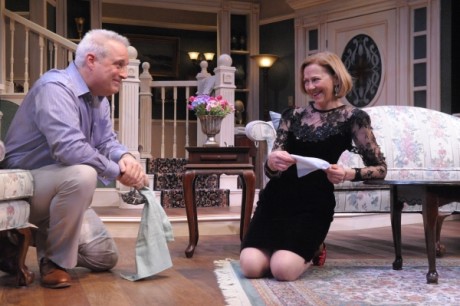
John: The men in the play are adjuncts to the women, which is a flip, because usually women characters are adjuncts to the men.
Kimberly: Well, we have to expel them.
Susan R: Yeah.
Caroline: Oh my god, I never thought about that.
Kimberly: We have to expel them. We’d rather not. We drive them out. And then when they’re all gone, the sisters come together on the couch. [Tess and Sara] come together for the first time over the tape recording. When I first read the play it rankled a bit because it was tiresome to me to see so many women defining themselves in terms of a male world—
Susan R: “You need a man to make you soft again.”
Kimberly: I know there’s rich comedy in it; I adore the relationship stuff. But it did not sit well. It’s a product of its time. But in the playing of it, the payoff is when the sisters are finally alone together. And we realize, this is what we’ve got—
Susan R: Pure, unadulterated happiness.
Kimberly: This is our identity. This is our joy. This is home. Sara is an ex-pat. Gorgeous is getting ready to leave home. Pfeni has no home; she’s a globetrotter. We find home on the couch, when all the men have fled.
Geoffrey has this line before his last exit, “I think I have a crush on all the sisters Rosensweig.” And in that moment it’s like he’s speaking for the audience.
Susan R: I love that.
It’s a like a line planted there to give the audience a way of naming what has been happening. And this is before the sisters bond on the sofa.
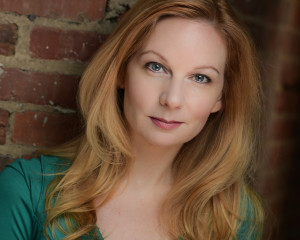
Susan Lynskey (Pfeni): That’s beautiful.
There’s a real connection in the playing, in the way you’re connecting sister to sister, each in very specific ways. Their mother Rita is dead, but she’s a presence in this play; clearly she has been real to each of the sisters in very specific ways. Because siblings, you know, if they have the same mother they don’t have the same mother.
Susan R: Yeah, my sisters and I were treated very differently.
Kimberly: Mine too.
It’s a deep current in the play.
Susan R: It’s epitomized by that moment on the couch when Sara is stroking my hair. My mother Rita stroked my hair, called me Gorgeous. Her [Sara’s] mother Rita treated her, “Where’s the other point?”
Kimberly: It’s deep for Sara because it’s not only an anniversary of our mother’s death; it’s the anniversary of Sara’s devastating, life-threatening surgery—and a birthday.
Susan L: I have a scene in the early morning with Gorgeous—
Susan R: “Don’t waste your time rebelling against Mother anymore. She’s not even here to enjoy it.”
Susan L: And then there’s one at the top of the show—
Kimberly: “She [Tess] is determined to make her life the opposite of mine.”
Susan L: And I say, “That is exactly what we set out to do because of our mother.”
Kimberly: “Yes, but we were right.”
Susan L: And I say, “So maybe is Tessie.”
There’s that point when Pfeni talks about herself as not being anyone’s dream daughter. And you could hear Rita in that speech.
Kimberly: Yeah.
Susan L: I mean, Gorgeous is gorgeous. And Sara is brilliant—
Susan R: Well, I’m the only one who grew up to be the woman our mother expected us to be. And I say you’re very troubled because you didn’t.
Kimberly: Yeah.
Susan R: And it’s implied that you didn’t either.
Susan L: I’m trying to be something that I’m not. A world traveller—
Susan R: “Don’t you want what any normal woman wants?”
Something similar is going on in Tess and Sara’s relationship—Tess is trying to be different from Sara. But there’s also something generationally different from what is going on between the three sisters and their mother Rita.
Kimberly: Almost the first thing I say is “Let’s talk about her future.” I have become pretty ineffectual at communicating. I spend almost every intimate, disclosive scene in the play imploring Pfeni to talk to my daughter. To intervene. [to Susan L] Please you must talk to her. Share your wisdom with her. [to Caroline:] Listen to your aunt. So something went awry, maybe like it did with Rita, and I’m panicked. My fundamental fear is that I’m gonna lose her [Tess]. She is about to light out into what I see as something dangerous, very foolhardy, and I don’t know how to stop it. So at the end of the play when Tess says, “I’m not going”—that’s the moment I’ve been trying to get to from the beginning. Finally I get to say “Thank you”— I’m not going to try to live your life anymore; you’re your own girl.
What did each of you do to find your character? What was your process and what choices did you make in rehearsal?
Kimberly: I may have had the hardest route to my character. I ricocheted from one extreme to another—on a superficial level how British is she, how American is she; on a personal level how warm or cold is she. Something that I started to latch on to is a notion of not wanting to be helped. All these people are reaching out to me, reaching out to me, and Sara doesn’t want—There are walls up around her, and they gradually come down. So that was something I could plant in my gut and viscerally play, to give me strength, occasional arrogance, a fear of weakness. Because when Sara is touched, she sort of caves, she sort of melts. That really helped to guide me. But I didn’t have it at the get-go. I was all over the place.
It’s totally credible in your performance that Sara has a high-powered banking position.
Kimberly: She’s had to be a man. She’s had to play like a man. She busted through the glass ceiling. But she does love her daughter. She does love her sisters. She is yearning for some connection, in spite of herself.
Susan R: Gorgeous is so well written, avoiding the traps is the most challenging thing. The main one is to play just the surface and make her a caricature or a stereotype, and the idea of that is offensive to me. So: really examining what she’s covering up. And making that an integral part of my inner fabric. The more comfortable I am on stage with all the words, the more playful I can be, the deeper and farther I can go. When we’re in the rehearsal hall I can work my ass off, and I do work my ass off, but it’s not until we’re on the set and in the clothes that I really— I do probably 30 percent of my work that last week.
Kimberly: I agree one hundred percent.
Susan R: Or maybe even more because the artifice starts to fall away. And all of the imagination work that we’ve done, the physical work that we’ve done, and the vocal work that we’ve done on our characters—it just starts to gel in an exponentially powerful way. An ease starts to happen.
Susan L: The truth of it all starts to happen when you’re in the house and in the family.
Susan R: Yeah.
Susan L: I remember the work as actresses we engaged that last week—an individuation of the “sister dynamic.” Refining with such specificity. How do I, Pfeni, relate to Gorgeous different from Sara? How does Sara relate to Gorgeous different from Pfeni? And each of us in the rehearsal room and the dressing room going line by line surfacing the exact nature of each clash or each alliance in the text, made the collective but also make the unique experiences among the three. For me as the “baby sister” that became defining in the moment-to-moment playing. On the page there’s three parts of Pfeni. She’s the watcher and the writer, but she’s also the traveller and the adventurer, and among her sisters she’s the peacemaker of the three. All of these characteristics reflect Wendy Wasserstein personally as she reveals in her biography. And Pfeni’s choices relate to Susan, me, very personally: in making the choice to be the artist. And how does one make that choice? When there are other pressures/voices from society? It comes with sometimes incredible sacrifice and also incredible joy. In Act Two, scene 1, Pfeni has writer’s block and has familial pressures referring to her life choice to be a global feminist writer, and Geoffrey says to her, “I’ve seen too many lives who didn’t have the chance to glow burn out overnight. We can’t idle time. People like us have to make the best art and best theater and the best book on gender and class in Tajikistan! ’Cause if we don’t do that, who is going to? And domestic bliss will have its own regrets, we all have regrets; so don’t idle time.”
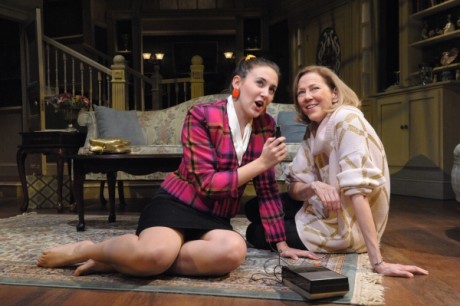
Caroline: I have a hard time finding my character without defining it through other people and how I relate to them. I go through the script and make three lists of what other characters say about my character, what I say about others, and what my character says about herself. With her mother, it’s that she is trying to control my life but she doesn’t know who she is. But Pfeni is just golden—she’s who I want to be, who I want to emulate. And even though Gorgeous has an effervescent, “funsy” way about her, Tess really respects the gravitas and the seriousness that Gorgeous gives to her religion, which is something Tess never got to identify with. I’m a big reader, so getting to read and analyze and see it separated out, that really helped me figure out how Tess feels and who Tess is.
There are things about the relationship between Tess and Sara that could have just blown up.
Caroline: Every scene ends in a fight.
Kimberly: There’s a confrontation in every scene until the end.
Caroline: If we are on stage together, we get in a fight, until the very last scene.
The reconciliation over the tape recorder.
Kimberly: Yes.
How you each relate to the other characters—when did that happen in the process? Did that come together in the eleventh hour as well?
Susan R: You walk in the rehearsal room the first day and there’s a tacit agreement among everyone that you’re gonna jump in and play. We’re together for ten weeks and it’s not artifice. We are authentic with each other. We take risks together. We’re professional but we’re not always polite—
Kimberly: Gotta get what you need—
Susan R: We’re not cautious. We just plunge in. We all hold hands and we jump off the end of the dock together into the cold lake. We say okay, we’re gonna do this together. And I think that tacit agreement at the beginning has allowed, oh my god—I have more authentic relationships with these two women than I have with my own two sisters.
Do you have sisters?
Kimberly: I have two.
Susan R: I’ve never had a couch scene with my sisters.
Kimberly: Me neither.
Caroline: I have one sister, an older sister.
Kimberly: In the rehearsal room you’ve got these words. That’s an obligation; you gotta say the little black words on the white page. And you have these other people—some of whom you have a history with, some of whom you’ve just met. That was a great description of just holding hands and jumping in—and giving each other permission to play—and going after what you need. There is a certain selfishness, which I think is a good selfishness, that’s about: I’m after something in this scene, I need to serve myself, and yes I need to play well with others too.
Susan L: And then there’s incredible caretaking, to understand what that other person needs, and to find those ways you can help and amplify while you’re pursuing your own. Knowing when to be a “great straight,” in comedic terms, for your partner’s comic moment—or when to be the comic; and your partner, a great straight. Responsive, caretaking scene-partnering—there’s incredible reciprocity on that stage.
Kimberly: Yes.
Susan R: I call it pinch-ouch. You know? When you feel safe with the people you’re on stage with, you can say: Well, you can give me more pinch, you can give it to me harder. Or I’ll pinch you harder. And it makes the frisson very lively.
Kimberly: The payoff is in the verisimilitude of the world.
The credibility of the connections among these characters—the play won’t work without that. You can have all kinds of “funsy”—
Susan R: But there has to be chemistry between the women.
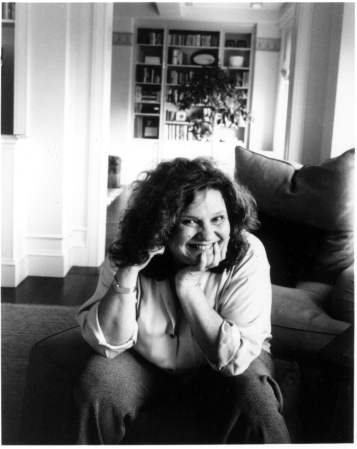
I have one last question, and it’s kind of big. I want to ask you to imagine yourself as Wendy Wasserstein. What if anything would be different for your character today than it was twenty-five years ago when the play was written?
Susan R: First of all. I do say things like, “You need a man to make you soft again.” It’s a little bit harder to put those words into the mouth of a woman in 2016.
Caroline: This play is such a feminist play. It’s so pro-woman. But there are tiny streaks—
Susan R: There are little things—
Caroline: —of things that are different now in terms of feminism. Like at the very end she says, “You are certainly brave enough and smart enough and certainly beautiful enough”—and somehow putting the emphasis on a woman’s looks equals successful—
Susan R: “Beautiful and brilliant,” “beautiful and brilliant”—
Caroline: I think that’s so different now. It should never be about how a woman looks.
Susan R: Yeah.
Caroline: It should be all about how she is brave and smart and strong. So I think they would cut the word beautiful out of a lot of this play.
Susan R: Yeah. I tallied the number of times that I used the words brilliant and beautiful, and it’s all over the place.
Susan L: What I love about hearing the words brave and brilliant and beautiful is I have always felt that Wendy is adding the brave and the brilliant to what has always been “Oh, you’re beautiful.” She’s naming out loud that women are brave and they’re brilliant in addition to the beauty norm we have always seen. And I love— I mean I see it in our female protagonists now: the bravery—
Susan R: Oh my gosh, yeah.
Susan L: —and their brilliance is what is now. The future is female. And it’s very exciting. And it’s about darn time. Wendy sees that in 1991 for each of the Rosensweig daughters. And it is my want for today and our near future that we cultivate and expand that for each and for all. We are brave enough and brilliant enough and beautiful enough that there is no ideal we should be seeking—we are all ideal, and uniquely so.
Running Time: Two hours and 45 minutes, with one intermission.
LINKS:
‘The Sisters Rosensweig’ reviewed by Ravelle Brickman.
In The Moment: Theater J’s ‘The Sisters Rosensweig’ by David Siegel.
The Sisters Rosensweig plays through February 21, 2016 at Theater J at The Washington DCJCC’s Aaron & Cecile Goldman Theater – 1529 16th Street, NW (16th and Q Streets), in Washington, DC. For tickets, call the box office at (202) 777-3210, or purchase them online.





